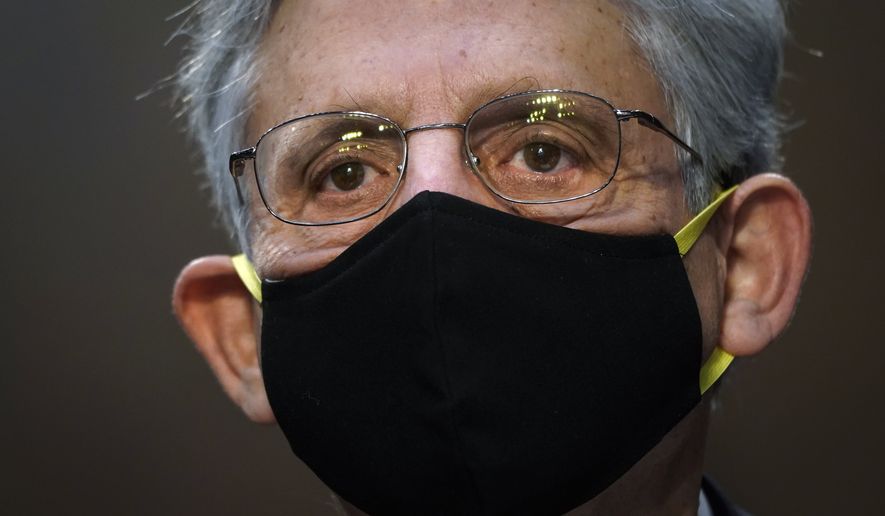Judge Merrick Garland, President Biden’s nominee for attorney general, sidestepped senators’ questions about the Russian collusion probe and Hunter Biden’s business dealings on Monday but vowed an aggressive prosecution of last month’s U.S. Capitol rioters.
At his Senate confirmation hearing, Judge Garland also pledged to advance Mr. Biden’s gun control agenda.
While Republicans on the Senate Judiciary Committee appeared unsatisfied with his answers, several signaled that they would vote for his confirmation next week.
Committee Chairman Richard Durbin, Illinois Democrat, told reporters that Republican senators have privately said they plan to support his confirmation.
Judge Garland, the senior judge on the U.S. Court of Appeals for the District of Columbia Circuit, was nominated for a big job in the past but didn’t receive a confirmation hearing.
In 2016, President Obama tapped him to fill a vacancy on the Supreme Court but the Republican-controlled Senate refused to hold a hearing or vote. He was never confirmed and the seat was ultimately filled by former President Donald Trump’s pick, Justice Neil M. Gorsuch.
At Monday’s hearing, Republicans pressed Judge Garland to allow special counsel John Durham to press on with his investigation into the origins of the FBI’s Trump-Russia probe.
Judge Garland trod carefully, saying he saw no justification for removing Mr. Durham but needed to learn more about the investigation.
“I understand that he has been permitted to remain in his position, and sitting here today, I have no reason to think that was not the correct decision,” he said. “I really do have to have an opportunity to talk with [Mr. Durham]. I have not yet had the opportunity.”
Judge Garland said some of the issues Mr. Durham was looking into had already been investigated by the Justice Department’s inspector general. An inspector general report released in 2019 found errors and omissions in the FBI’s handling of Foreign Intelligence Surveillance Act applications.
“I do think somebody should look at what happened with respect to FISAs, absolutely, and I believe the inspector general has done that,” he said.
Sen. Ted Cruz, Texas Republican, noted that former Attorney General William Barr gave more explicit answers during his confirmation hearing about allowing special counsel Robert Mueller to finish his investigation.
“To show his integrity and commitment to being nonpartisan, [Mr. Barr] said he wouldn’t terminate Mueller absent good cause. You had the opportunity to do the same thing,” Mr. Cruz said. “You are refusing to give the same commitment.”
Judge Garland responded that he would never make a decision based on politics. He repeated that he simply didn’t have enough information about the probe.
He also repeatedly stressed that he would serve as an independent attorney general who would resign if Mr. Biden or anyone else asked him to do something illegal.
In response to questions about the federal investigation into tax and business dealings of Mr. Biden’s son Hunter the judge pledged to keep politics out of the case.
“The president made abundantly clear in every public statement before and after my nomination that decisions about investigations and prosecutions will be left to the Justice Department,” Judge Garland said. “That was the reason I was willing to take on this job.”
Democrats, meanwhile, pressed Judge Garland on last month’s insurrection at the U.S. Capitol. If confirmed, he would oversee the investigation into the riot, which already has resulted in charges against hundreds of individuals.
He pledged that to prioritize the probe, describing the assault on the Capitol as a “heinous attack that sought to disrupt a cornerstone of our democracy.”
He also voiced support for a proposed independent commission to investigate the events of Jan. 6, though he cautioned that the probe should not interfere with prosecutions.
Judge Garland also said he would advance Mr. Biden’s gun control measures if confirmed as attorney general.
“The role of the Justice Department is to advance the policy program of the administration as long as it is consistent with the law,” he said. “Where there is room under the law for the president’s policies to be pursued, I think the president is entitled to pursue them.”
A second hearing is set for Wednesday with testimony from a panel of outside witnesses.
Mr. Durbin said the committee will vote on the nomination on March 1, setting up a floor confirmation vote later next week.
• Jeff Mordock can be reached at jmordock@washingtontimes.com.




Please read our comment policy before commenting.